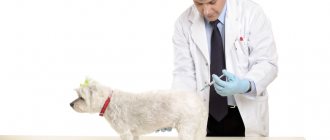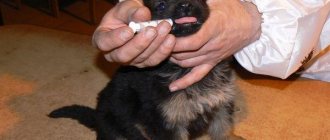Every dog owner knows that vaccinations are a reliable and effective way to protect four-legged pets from viral and bacterial infections. Pomeranians need vaccinations just like other dog breeds.
Timely vaccination of Pomeranians creates long-term immunity in them, allowing them not to fear infection with dangerous diseases. In order for the vaccination to give a positive result, and for the pet to have no side effects, the Spitz owner needs to study in detail all the nuances of this procedure.
Procedures before vaccination
Vaccination is an important event for every dog. You need to prepare for it in advance. Before vaccination, a number of steps must be taken:
- Treatment of Pomeranian Spitz from internal parasites . Deworming is carried out two weeks before the vaccination itself. In case of severe infestation of the animal’s body, treatment is carried out twice with a break of 10 days.
- Treatment against ectoparasites (ticks, fleas, lice eaters). The procedure can be carried out independently, strictly following the instructions for the corresponding drug.
- 3 - 4 days before vaccination, do not subject the dog to physical activity. Avoid moving, changing your usual environment and other factors that lead to stress.
- On the day of vaccination, do not give your pet food.
- A few days before vaccination, begin to conduct a thorough examination of the Spitz and measure the dog’s temperature daily.
After vaccination, it is also necessary to follow certain rules, which the veterinarian will tell you in detail. For example, for 6 - 7 days after the procedure, the Pomeranian cannot be bathed or walked.
Carefully monitoring your Pomeranian before vaccination and following the recommended rules before the procedure will help achieve the maximum effect of vaccination and avoid complications.
How quickly does immunity develop after vaccination and how long does it last in Pomeranians?
Only ten days to two weeks after vaccination does the puppy develop stable immunity to the virus. It is at this age that you need to treat the puppy very gently and protect it from infections; immunity has not yet formed, and the puppy is very vulnerable. If vaccinations require double or even triple vaccination, then complete immunity to viruses is formed only after a two-week quarantine after the last vaccination.
The duration of action of the vaccine, that is, the duration of action of the body’s defense system (immunity), is influenced by the type of pathogen to which the vaccine is aimed. Immunity can last from several weeks to many years; after the vaccine has expired, booster vaccination is necessary to maintain immunity.
Cases when it is necessary to postpone
Sometimes a scheduled vaccination procedure needs to be postponed. This happens in the following cases:
- Upon examination, the dog was found to have skin rashes, fever, general deterioration of condition and signs of illness.
- Pregnant or lactating bitches.
- Puppies under 2 months.
- During the change of teeth.
- Taking medications during treatment for any disease.
- If your dog has an allergic reaction to a previous vaccination.
- Bitches in heat.
In all these cases, vaccination is postponed. The veterinarian will tell you when the procedure can be performed.
If you ignore the recommendations and vaccinate even if there are contraindications, negative consequences may occur.
Pros and cons of vaccination
When caring for a Spitz puppy, timely vaccinations are of great importance. Not all dog breeders take this into account, because there is always a fear that the vaccine will not be of very high quality or even cause harm to the dog. However, the following points will help you make sure that vaccination is still necessary:
Similar article: History of origin and breed standard of the German Miniature Spitz
- If you don't vaccinate your dog on time, you will constantly worry about its health. Without proper protection and a strong immune system, even a harmless walk can bring you a lot of trouble. As a result, you will have to spend even more money and effort, and the health of your four-legged friend will be at risk;
- a Spitz, even one suitable in age, will not be able to take part in various exhibitions. A dog breeder will receive a permit for exhibition activities only if his pet is vaccinated;
- Vaccination for a Spitz puppy is mandatory, as it will strengthen his immunity, and any disease in the future will not be so acute.
No matter how you prepare for vaccination, it is advisable to consult your veterinarian in advance. He will tell you which medications your dog needs in the first place, and which vaccinations it is better to do without. An additional examination will not hurt: before vaccination, you must be sure that your pet will calmly endure this type of procedure.
Types of vaccines
Pomeranian Spitz are vaccinated with vaccines of both domestic and foreign origin. Any vaccine is classified according to the number of viral structures included in its composition, as well as the state of the virus inside the vaccine.
Based on the number of viral structures there are:
- Monovalent vaccines (monovaccines) contain the causative agent of one disease.
- Polyvalent vaccines - they contain several (from 2 to 9) types of infectious agents.
According to the status of the pathogenic agent:
- Live vaccines contain weakened pathogens.
- Dead vaccines are composed of dead pathogens.
Veterinarians note that vaccination with live vaccines helps to develop more lasting immunity compared to a dead vaccine.
Scheme and rules
The first vaccination should be carried out on a Pomeranian Spitz no earlier than 2 months of age. This is due to the fact that from the moment of birth until 2 months of life, the puppy is protected by the immunity received from the mother along with colostrum (colostrum). If you carry out the procedure in the first two months, there will be no effect from the vaccination.
After 2 months of age, colostral immunity begins to weaken. This period is the most critical for the puppy's health. Now is the time to start vaccinating.
The veterinarian prescribes the vaccination schedule. The general rules are clearly displayed in the table.
| Age | What to vaccinate against |
| 8 - 9 weeks | Complex treatment against leptospirosis, hepatitis, distemper, enteritis and parainfluenza |
| 12 weeks | Repeated treatment against the same five diseases |
| 6 months (completed teeth change) | Third vaccination against a complex of the same diseases |
| 8 months (if there is a high probability of infection, then at 6 months) | Rabies vaccination |
| 1 year | Revaccination against leptospirosis, hepatitis, distemper, enteritis and parainfluenza |
An adult Pomeranian should be vaccinated annually, according to the schedule.
Sometimes serums are used instead of vaccines. These drugs should not be confused.
The serum consists of ready-made antibodies and is used in case of an existing disease. The vaccine is used to prevent diseases and contains weakened or killed pathogenic antigens.
Possible diseases
Spitz care should include disease prevention. Vaccination does not guarantee that the immune system will survive the disease against which the vaccine was given. But the chance of infection will be much lower. Typically, the vaccine is given to prevent the following diseases:
- distemper;
- parvovirus enteritis;
- rhinotracheitis;
- adenoviral hepatitis;
- rabies;
- leptospirosis.
What vaccinations are given to Spitz depends on age or condition. Combination vaccines do not treat all diseases at the same time. It is necessary to choose the right drug.
Formation of immunity
Immunity does not develop in Pomeranians immediately after vaccination.
The final production of antibodies to the introduced pathogen will be completed approximately 10 to 14 days after vaccination.
At this time, the dog is susceptible to the disease.
That is why it is necessary to observe quarantine until the formation of stable immunity is completed.
During the quarantine period, you cannot walk your dog on the street or allow contact with other, especially stray, animals. Do not let your Pomeranian sniff the owner's shoes and outerwear . The furry baby needs to be provided with peace and special attention so that the period of immunity formation passes without undesirable consequences.
What vaccinations does a puppy need?
Nature has blessed the Japanese Spitz with excellent health, but the little puppy’s immune system is not yet effective enough to protect the young body from the effects of these dangerous infections. A dog, especially a Spitz, is a social animal and walks are an integral part of its life. While walking, on the road or at a show, while playing with other animals or coming into contact with their feces, a Spitz can become infected with a deadly disease. Dog vaccinations provide an immune booster that will protect your furry pet.
Possible consequences
If you follow all the recommendations before vaccination, your Pomeranian usually does not experience any unpleasant consequences after the procedure.
But sometimes changes in the behavior and condition of the pet are observed.
Some of them are harmless and are a normal reaction of the body to vaccine administration. This:
- Apathy and lethargy of the Pomeranian Spitz within 24 hours after vaccination.
- Slight swelling and redness at the injection site.
- In the first 2 - 3 days after vaccination, the dog has poor appetite, and occasional diarrhea is possible.
- A slight increase in temperature on the first day to 39°C.
Other changes in the dog’s condition indicate the presence of side effects and require mandatory consultation with a veterinarian:
- Cramps.
- Excessive salivation.
- Continuous diarrhea and vomiting.
- Significant swelling of the mucous membranes.
- Breathing problems.
Most often, these symptoms indicate an allergic reaction of the body to the vaccine . For allergies, your veterinarian will prescribe antihistamines and prescribe appropriate treatment.
General rules
The breeder must keep a veterinary passport for each puppy with notes on all vaccinations given. Upon purchase, this passport is issued to the new owner of the animal along with other documents. Ideally, the breeder should also help draw up a further vaccination and prevention plan.
Please note that only completely healthy dogs can be vaccinated.
Before the procedure, the puppy must be dewormed: parasites reduce the level of immunity. The first time the puppy is given deworming medication is at the age of 3-4 weeks (it is advisable that the breeder do this). The second treatment should be carried out no earlier than 14 days after the first and 10–15 days before the vaccination itself.
Anti-worm medications are given strictly according to instructions. Many of them cause thirst, so make sure your pet's water bowl is not empty at this time. Give your Spitz activated charcoal to avoid toxicosis: before dying, parasites release large amounts of harmful substances.
Also, if necessary, you need to get rid of fleas and ticks in advance.
2-3 days before vaccination you need to check the dog’s body temperature. To do this, a thermometer lubricated with Vaseline is inserted into the anus a third of the way and held for about 15 minutes. This procedure cannot be carried out immediately after eating or sleeping; it is better to wait up to a quarter of an hour. Normal temperature for dogs is between 37.5–39.3 °C.
Take your temperature several times throughout the day, recording the results. If the puppy is healthy, it should remain almost unchanged.
Vaccination should be postponed in the following cases:
- elevated temperature;
- indigestion, weight loss;
- rash;
- discharge from the eyes;
- inappropriate behavior or stress due to the move;
- deviations in physical development.
In all these cases, you must first cure the dog.
After taking the hyperimmune serum, at least two weeks should pass. If the dog has been treated with immunosuppressants, the appropriate time for vaccination should be determined by a veterinarian.
Self-conducting
Pomeranian Spitz vaccinations can be done at home yourself. To do this, you need to perform a number of actions:
- Choose the appropriate vaccine. A veterinarian will help you choose. You need to purchase the drug only from a veterinary pharmacy. You need to check the expiration date of the vaccine, storage conditions, presence of instructions and stickers.
- Home delivery of the vaccine. The drug should be taken home immediately after purchase and placed in a cool and dark place ( refrigerator). The vaccine can be stored outside the refrigerator for no more than two hours.
- 30 minutes before the procedure, the Pomeranian Spitz is given an antihistamine (suprastin, loratadine, tavegil) to avoid an allergic reaction.
- Before the injection, you need to hold the vaccine bottle in your hands for several minutes so that the drug warms up to body temperature.
- The dog is vaccinated immediately after opening the bottle of vaccine. A disposable syringe is used for injection.
- Get vaccinated, strictly following the instructions . Drugs for different diseases are administered in different ways: subcutaneously or intramuscularly.
- Dispose of the drug vial and the remaining vaccine by burning.
Even after vaccinating a Pomeranian Spitz yourself, you need to take into account that only a veterinarian can make a note about the procedure performed in the dog’s passport.
Therefore, it is best to go to a veterinary clinic or call a veterinarian at home for vaccination.
Pomeranian Spitz: routine vaccinations and vaccinations for Spitz by age
The appearance of a newborn Spitz puppy in the house is always a great joy for the owners, but also great worries.
Therefore, at first you will need to show a lot of patience in training, so that your pet will subsequently be accustomed to the rules of behavior in an apartment or house.
If possible, it is better to take a vacation for the first time, because a small puppy is like a small child, and for its safety it is necessary that someone look after it.
What to feed a Spitz puppy
From the age of one month, you can start feeding the puppy with raw minced beef, prepared yourself, by cranking the meat 2 times in a meat grinder, giving it to the baby in the form of small balls and little by little. Then you need to gradually introduce dairy products: cottage cheese, yogurt, kefir, etc. – they should be low-fat, without harmful additives. It is good to feed your baby orange with rice or buckwheat porridge with meat.
Infrequently, you can give low-fat boiled sea fish, boiled chicken, turkey or rabbit. You can also add boiled chicken yolk to your meals 2 times a week. Natural products should be fed alternately with dry food, good quality, pre-soaked with water.
To feed the puppy, you need to purchase special dishes, immediately determine a permanent place for this , and feed at approximately the same time:
- at 2 months – feed 5 times a day;
- at 3-4 months - feed 4 times a day;
- at 4-6 months - 3 or 4 times a day;
- from 6 months - 3 or 2 feedings a day;
- from 8 months – 2 feedings a day.











